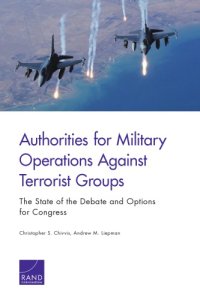
Ebook: Authorities for military operations against terrorist groups: the state of the debate and options for Congress
Author: États-Unis., Chivvis Christopher S., Liepman Andrew
- Tags: Executive power, Executive power--United States, Intervention (Droit international), Intervention (International law), Legislative power, Legislative power--United States, National security--Law and legislation, National security--Law and legislation--United States, Pouvoir exécutif--États-Unis, Pouvoir législatif--États-Unis, Pouvoirs exceptionnels--États-Unis, Terrorism--Prevention--Law and legislation, Terrorism--Prevention--Law and legislation--United States, War and emergency powers, War and emergency po
- Series: Research report (Rand Corporation) RR-1145-1-OSD
- Year: 2016
- Publisher: Rand
- City: United States
- Language: English
- pdf
"The United States has been undertaking counterterrorism operations against current threats under authorizations established in 2001 and 2002. Relying on this legislation is far from ideal, however, and it would be better if Congress updated these authorizations to reflect today's terrorism challenge. In early 2015, the Obama administration submitted its own draft authorization for the use of military force (AUMF) to Congress, the content of which has drawn criticism from both sides of the aisle. The United States also faces a developing threat from the Islamic State of Iraq and the Levant (ISIL). The group is responsible for multiple terrorist attacks outside Iraq and Syria, including large-scale attacks in Lebanon and Paris and the downing of a Russian airliner. Limited U.S. air assaults have had some success against ISIL, but the need to dismantle its terrorist and military capacity has gained new urgency, as has the need for a new AUMF. This report surveys the debate over the requirements for a new AUMF. It assesses the terrorist challenge to which any such legislation should respond, outlines the purposes of the legislation, makes specific recommendations about key elements, and offers congressional options. A principal challenge for Congress is to signal support for military operations against both the old, persistent threat (al Qaeda, its affiliates, and other jihadist groups) and the new, emerging threat (ISIL and its allies). Congress faces six considerations in deciding whether and how to move forward to pass a new AUMF: (1) whether to impose geographical limitations on the authorization, (2) whether to place limits on ground forces, (3) how groups or individuals are identified, (4) the stated purposes for using force, (5) reporting requirements, and (6) sunset and renewal clauses"--Publisher's description.
Download the book Authorities for military operations against terrorist groups: the state of the debate and options for Congress for free or read online
Continue reading on any device:

Last viewed books
Related books
{related-news}
Comments (0)